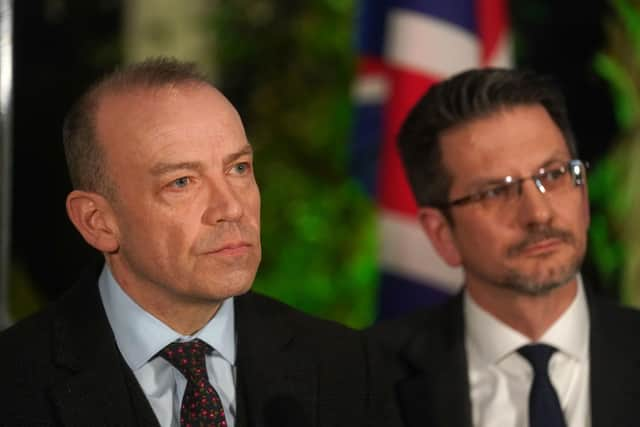Owen Polley: NIO pair wouldn’t be the first Tory ministers to come here and talk up their unionism, then act in a way that undermines the Union


Chris Heaton-Harris introduced legislation at Westminster that means he does not have to call a Stormont election until January 2024.
Previously, to avoid meeting its legal obligation, the government delayed the requirement for a poll for up to twelve weeks. Most of us assumed, though, that we would be voting for a new Assembly this year, even if it meant waiting until the spring, when council elections are scheduled.
Advertisement
Hide AdAdvertisement
Hide AdGiven the unexpected nature of the secretary of state’s decision, what questions does it raise?
Well, first of all, it’s fair to ask whether the government is really confident of sorting out the protocol in a way that satisfies unionists, given the length of the delay. If they were on the brink of a comprehensive agreement, as some media have claimed, then ministers would hope that the executive would soon be restored.
Only last Wednesday, Mr Heaton-Harris told Sir Jeffrey Donaldson in the House of Commons, that “We need to get to a position through negotiation, or maybe through the Northern Ireland Protocol Bill…, that his constituents can receive goods east-west in the way they used to.” On Friday, the DUP’s Assembly protocol spokesman, Gordon Lyons, said his party had heard “lots of good things” about the talks.
You don’t have to be an arch-cynic, though, to infer that, either a deal is not particularly close, or it will disappoint unionists and fail to address the constitutional issues raised by the sea border. Apart from the ramifications for the Union, that failure would render the UK’s negotiations with the EU a thorough waste of time and effort.
Advertisement
Hide AdAdvertisement
Hide AdEvery now and again, the government and its supporters have implied that the protocol had no impact on Northern Ireland’s constitutional position in the first place. But it was the former Brexit minister, Lord Frost, who pointed out, “The current problems with the protocol go to the heart of our territorial integrity, of what it means to be one country and one market. They will not disappear.”
It was an accurate diagnosis of the sea border’s effects by the man who initiated the current negotiations with Brussels.
If the secretary of state’s decision suggests that a deal with the EU will not save Stormont, then, why not let democracy take its course anyway?
After all, Chris Heaton-Harris and his garrulous minister of state, Steve Baker, have spent months reprimanding the DUP for its decision to collapse the executive. They seem convinced that the people of Northern Ireland are desperate for power-sharing to return.
Advertisement
Hide AdAdvertisement
Hide AdIf that is the case, you’d expect the electorate to put the party that is preventing Stormont from being restored firmly in its place. Surely a disastrous election for the DUP would force it to change course?
Unfortunately for NIO ministers, the opinion polls do not suggest that unionists are unhappy with the party’s current tactics. Despite overwhelming pressure from the government, most of the media and various third sector campaigners, pro-Union voters seem stubbornly inclined to support the idea that power-sharing cannot resume until the protocol is sorted out properly.
The DUP’s poll numbers have remained stable since Paul Givan’s resignation in February of last year. Indeed, the latest surveys suggest that Sir Jeffrey Donaldson’s party is more likely to lose support to the TUV, which is no less opposed to restoring the executive, than parties calling for Stormont to come back.
With that in mind, it’s possible that the government is worried that this sentiment would be reflected in an Assembly election result. You might conclude that the secretary of state doesn’t want to risk testing the attitudes of voters democratically and, instead, has decided to stall, to give unionist opinion more time to move in the direction he would prefer.
Advertisement
Hide AdAdvertisement
Hide AdWhatever its motivations, the indefinite election delay is another sign that this administration doesn’t have much of a plan for solving the impasse in Northern Ireland.
Heaton-Harris cited his discussions with “political representatives, businesses and communities” here, claiming that a poll “is not the best course of action to facilitate the restoration of the executive.” That sounds like another hint that the result would not be amenable, and might reflect the fact that the protocol, rather than Stormont’s restoration, is the priority for most unionists.
If anything, Heaton-Harris and Baker show signs that they’ve adopted the institutional group-think of the NIO. The idea that Northern Ireland should be treated as a place apart from the rest of the UK, the tacit understanding that the government’s role here should be entirely neutral and the tendency to chide unionists for caring too much about their constitutional position.
They wouldn’t be the first Tory ministers to come here and talk up their unionism, then act in a way that undermines the Union. For Conservative secretaries of state, the NIO seems to be something like The Borg in Star Trek. In the sci-fi series, this shadowy network of cyborgs assimilates humans, who cannot then act independently, but instead work to the agenda of The Borg’s ‘hive mind’.
Advertisement
Hide AdAdvertisement
Hide AdJulian Smith, who, despite escaping the NIO, stil frequently sounds like the SDLP MP for Skipton and Ripon was the classic example. Heaton-Harris and Baker could yet redeem themselves, but they seem to be going steadily in the same direction.